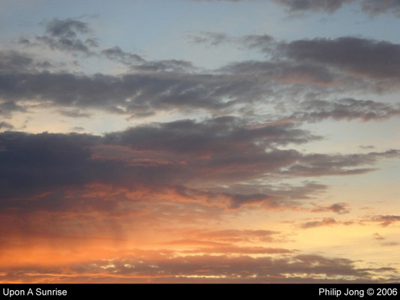Thursday 01 February 2007
Frosted Cones
 |
By Philip Jong
• At 01:01 AM
• Under Media
Public Post •
Comments •
Trackbacks •
Permalink
Monday 01 January 2007
Is It Time To Make New Year’s Resolutions?
I will be the first to admit that I am terrible in both making and following my New Year’s resolutions. Like every year before this year, I have made it one of my New Year’s resolutions to follow through all of my unfulfilled resolutions from last year (if you must ask, my list of resolutions for 2007 is indeed very long). Surprisingly, the tradition of making a New Year’s resolution is not rooted to modern times but to Roman mythology and the ancient god Janus. The two faces of Janus—one facing forward to the future and one looking back to the past—symbolize the transition with changing of the years. The month of January, which the Romans named after Janus, is then designated as the first month of a new year. Despite this, early Christians had once chosen to instead celebrate New Year Day on the day of Nativity (December 25) or the day of Annunciation (March 25); it was not until later that the Julian calendar was revised so that New Year celebration would return to January 1. As a Chinese myself, I also celebrate the new year according to the lunar Chinese calendar, which for 2007 falls in the month of February. In other words, I may have yet another month to procrastinate on my unfinished resolutions, before I have to add them to my list for this year!
By Philip Jong
• At 01:01 AM
• Under Column
• Under Life
• Under World
Public Post •
Comments •
Trackbacks •
Permalink
Friday 15 December 2006
The Meaning Of Christmas: A Cultural Perspective
With the holiday season approaching, I wonder what the true meaning of Christmas is in a multicultural society such as Canada today. As a secular tradition, Christmas Day is originally a Christian celebration that marks the birth of Jesus of Nazareth. It is now celebrated worldwide, partly because of the widespread of Christianity and the influence of western culture in many countries. The tradition of winter festivals, such as the Natalis Solis Invicti celebrated by the Romans or the Yule celebrated by the Pagans, to which Christmas in part owes its origin as a festival holiday, has largely been forgotten by history. Instead, in modern times, Christmas is often celebrated in conjunction with or in place of other religious holidays. Hanukkah, a Jewish celebration that starts on the 25th day of Kislev in the Hebrew calendar, is observed by those who are seeking a Jewish alternative to Christmas, even though the Hannukkah festival can fall in as early as November and as late as January instead of December that is for Christmas.
Today, Christmas is recognized as both a secular and non-secular holiday. As a Chinese myself, I do not celebrate Christmas as a religious festival but an opportune holiday to spend time with my family. In a multicultural society, the new meaning of Christmas goes beyond that of the celebration of a single religion; it is an opportunity to celebrate family values and to be together with those who love us and those who we love back, regardless of religious beliefs.
By Philip Jong
• At 01:01 AM
• Under Column
• Under Family
• Under Life
• Under World
Public Post •
Comments •
Trackbacks •
Permalink
Friday 01 December 2006
Bouquet In Nature
 |
By Philip Jong
• At 02:01 AM
• Under Media
Public Post •
Comments •
Trackbacks •
Permalink
Wednesday 15 November 2006
Two Elections In Extreme: Bush Versus Miller
This month the public witnessed the unfolding of two very differently held elections in the United Status and Canada. In the United Status, the midterm elections heralded the downfall of the Republicans and the ascension to power by the Democrats in both the House and Senate. In Canada, the municipal elections in Toronto (where I live) oversaw the domination of incumbent mayor David Miller over the two frontrunners Jane Pitfield and Stephen LeDrew. Notwithstanding any obvious dissimilarity in the landscapes of these two elections and in the policies by which they had been driven, an understated difference was the presence in the former and the absence in the latter of a major political controversy over which the respective voters had to contend. For the United Status, the continuing war with Iraq had deeply divided the country during election and ultimately became an embarrassment for George Bush and his administration. By contrast, for Canada, the election was a low-key affair for which David Miller had coyly avoided any political scandal in the media that would have attracted unwanted criticism by the voters. In the end, the defeat of George Bush and the victory of David Miller stand as a great example in the study of elections in extreme. In politics, after all, no news is perhaps truly good news.
By Philip Jong
• At 01:01 AM
• Under Column
• Under Life
• Under World
Public Post •
Comments •
Trackbacks •
Permalink
Wednesday 01 November 2006
Happy Pumpkin
 |
By Philip Jong
• At 02:01 AM
• Under Media
Public Post •
Comments •
Trackbacks •
Permalink
Sunday 15 October 2006
A Blinded Tale Of Two Religions
Last month many Muslims openly accused Pope Benedict XVI of insulting the religion of Islam during an academic address given at the University of Regensburg in Germany where he had seemingly characterized the teachings of the Prophet Mohammed as evil and inhuman. The controversial speech sparked much outrage and backlash among many followers of the Islamic faith, despite a prompt apology by the pontiff that the offending comment about the holy wars reflected neither his personal nor the Vatican’s view. At least one killing, that of Sister Leonella Sgorbati in Somalia, had been attributed possibly as retaliatory attack to the pope’s remark. While an informed (or even heated) exchange between two religions should never be discouraged (or snuffed), to this day I question exactly how many of these protestors were truly informed of the whole context in which the pontiff’s remark was made. Little was told of the fact that the inflammatory statement was actually not of his own words but a straight quote he made of the 14th century Byzantine Emperor Manuel II Palaeologus, “Show me just what Mohammed brought that was new, and there you will find things only evil and inhuman, such as his command to spread by the sword the faith he preached.” Moreover, a complete reading of the text would reveal the fact that the pope was not at all arguing for a condemnation of the Muslim belief but, to the complete contrary, a rejection for the use of religion as a motivation for violence, Muslims or Christians. This observation proves that when a religion is so blindly followed among faith seekers without understanding the full context in which these beliefs should be asserted, then such practice is no different from that of simply acting out the roles in a fantasized tale, regardless what God or Prophet it may involve.
By Philip Jong
• At 01:01 AM
• Under Column
• Under World
Public Post •
Comments •
Trackbacks •
Permalink
Sunday 01 October 2006
Upon A Sunrise
 |
By Philip Jong
• At 02:01 AM
• Under Media
Public Post •
Comments •
Trackbacks •
Permalink
Friday 15 September 2006
9/11, Five Years Later
Early this month the world mourned the five-year anniversary of 9/11. To this date, my memory of this tragic event remains vivid. At the time, I was attending a conference in Washington DC and was only blocks away from the White House. Since that day, the world has learned of the ongoing threat of terrorism on the masses and the price we must pay to protect ourselves from fanatics whose moral and ideology differ from our own. More importantly, 9/11 reminds us that we do not live our lives in isolation from other people around the world and that plans to achieve peace must extend far beyond the arbitrary borders created by nations, ethnicities, and religions. Any attempt to achieve long-lasting peace and security by building rather than breaking the walls that divide the human race is doomed to fail. Even though one day the memory of 9/11 may finally fade in people’s minds, the lesson which the human race has learned from it must never be forgotten, since those who fail to learn from history are condemned to repeat it again.
By Philip Jong
• At 12:01 AM
• Under Column
• Under Life
• Under Travel
• Under Work
• Under World
Public Post •
Comments •
Trackbacks •
Permalink
Friday 01 September 2006
Curious Duck
 |
By Philip Jong
• At 01:01 AM
• Under Media
Public Post •
Comments •
Trackbacks •
Permalink